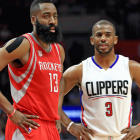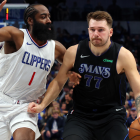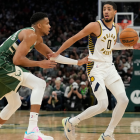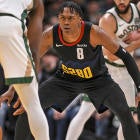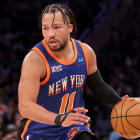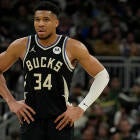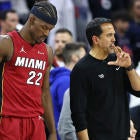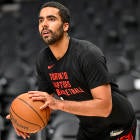Last season, were it not for the glitch-in-the-system Warriors, the Houston Rockets would have been the NBA's best offensive team. They were second in offensive rating, second in points per game and second in true shooting. They were incredible at that end, even historic, jumping from 41 to 55 wins thanks largely to the brilliance of James Harden and a steadfast commitment to launching 3-pointers.
Now here comes Chris Paul, who -- on paper -- could threaten to disrupt those dynamics. He dominates the ball, which would seem to undermine Harden's role, and he's a mid-range master -- precisely the shot the Rockets avoid. Through an analytic lens, you could convince yourself that Paul is a bad fit next to Harden, or if you really want to reach, that he somehow doesn't make the Rockets better as a contradiction to what they do best.
This is the problem with falling in love with the paper game; it's easy to forget about the actual game. Basketball is still about who has better players, and the Rockets now have two of the world's 10 best. Though the Warriors have raised the roster-building bar -- making it so gathering great talent alone isn't enough anymore; you have to have great talent that fits -- it still starts with the talent. If you don't have multiple star players in todays game, you can fit like a glove and you're still not winning anything of note.
In fact, last season, the Rockets were about as good as a single-star team can be in this super-team era. They made it to the second round, and had a few things gone differently they looked plenty capable of defeating the Spurs to reach the conference finals. That's a borderline great team that doesn't necessarily needs fixing.
But that's the thing: Paul doesn't need to fix the Rockets any more than Kevin Durant needed to fix the Warriors. He can simply usher in the next step. And besides that, there's more than one way to win. Sure, the Rockets won 55 games shooting a little more than seven mid-range shots per game, by far the fewest in the league. But the Spurs won 61 games while shooting almost 25 mid-range shots. The Warriors, arguably the greatest team ever, won 67 while launching 17.6 mid-range shots a game. That number rose to 18 in the playoffs.
Indeed, these days, we can always find a stat to prove a point and another to contradict it. Basketball hasn't changed as much as people think. It's still about getting buckets and stopping the other team from doing the same, and Paul pretty obviously does a lot of both. Don't overthink it.
This is not to say teams don't need to take and make a lot of 3-pointers to win these days. They absolutely do. But it's not like Paul can't make 3s, and he sure as hell will create a lot of 3s for teammates. With so many defensive switches on the perimeter now, teams are basically playing a match-up zone. The best way to break any zone is to penetrate gaps, to get into the teeth of the defense and kick out to shooters. Nobody gets into gaps better than the probing Paul.
The mid-range shot is an example of something that doesn't make sense on paper but often does on the court. An easy 15-footer can get a shooter going. It can sustain a run or end one. It can eliminate over-passing. It can better control tempo when necessary, like in the playoffs -- particularly late in games.
To that point, shooting a lot of 3-pointers is a statistically justified approach for the long haul. The Rockets proved that. But in the playoffs -- which is the only thing a team like Houston cares about -- games often come down to a few clutch-time possessions. Being less predictable in those situations makes a club tougher to defend.
This is true for individual scorers and teams: The ones who can beat you the most ways are the most dangerous. Shut one thing down, they can go another. Remember when Kevin Love stopped Stephen Curry at the end of Game 7 in the 2016 Finals? That didn't happen because Love suddenly tapped into some reserve of lateral quickness that previously had not existed, it was because he knew the shot Curry wanted. Given the score and time, he knew Curry was hunting a 3 and didn't have to worry about anything else. When you can narrow your defensive focus to a particular shot or area of the court, your job is a lot easier.
For the most part, you can do this when guarding the Rockets. You know they're hunting 3s. Last season, they took 40.3 per game, by far the most on the league, and they made more (14.4 per game) than any team in history. They weren't necessarily that accurate from range, shooting just 35.7 percent from beyond the arc, which was 15th in the league. They just shot so many that the math eventually played out. That makes them really good and what they do -- but it also makes them really predictable. If a defense can't lock in on the 3-point line because Paul threatens more areas of the court, Houston gets tougher to defend.
Speaking of defense, Paul will make major contributions on that end. The Rockets were a below-average defensive team last season: 18th in defensive rating -- and often were unable to get stops at critical junctures. Paul remains one of the toughest defenders in the league. He'll also help a ton in the turnover department. Harden won't have to do so much, so his turnovers should go down, and the Rockets' 1.7-to-1 assists-to-turnovers ratio also should improve.
All of this will be magnified on possessions in the playoffs, in possession basketball games that often come down to a few buckets. The Oakland A's played Moneyball before everyone else, and the numbers played out over the long haul. But they haven't made it to a World Series in the Billy Beane era, because the playoffs come down to situations over statistics. You need star players to make star plays. Houston may not win 55 games again. It may win 52 or 53, or maybe 60. Either way, Paul better equips the Rockets to win when it counts most.













